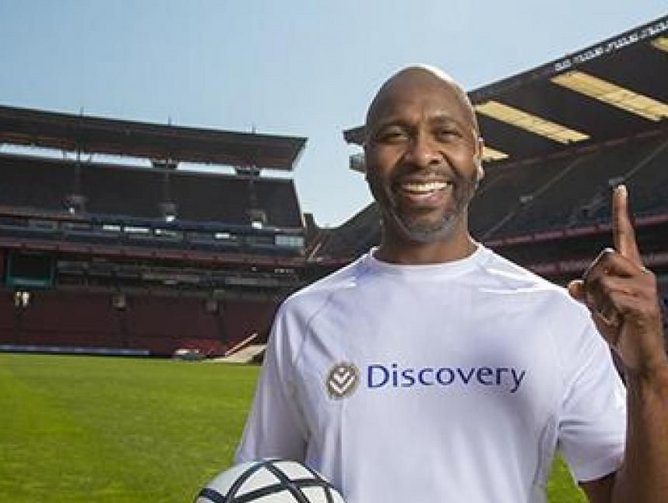How Discovery Limited promotes a culture of innovation that scales globally
Founded in 1992, Discovery Limited is a diversified insurance and financial services organisation. Discovery began in South Africa as a small, specialist risk insurer, and has since expanded to major markets across the globe. As an organisation with innovation at its core, Discovery uses a mix of technology and best practice to generate value for clients, employees and shareholders alike. “The core innovation that Discovery has pioneered internationally is the concept of a shared-value insurance model,” explains Chief Digital Officer, Anton Fatti.
Fatti has been with Discovery for seven years. With a background in computer science and applied maths, as well as an interest in ‘big picture’ business practices, he has experience in developing tech and scaling strategy at small technology companies. In his work at Discovery, he applies many of his learnings from the startup world. “What drew me to Discovery was the real aim of improving society,” he says. “It’s a higher purpose at the core of Discovery that guides our decisions.” Discovery is a values-driven company where it’s common to find employees with 10 to 20 years’ tenure, for example. Currently, Fatti oversees the central team in the Digital Lab, advising the business on digital best practice and exploring new technologies and digitally enabled business models. “Digital transformation is not something flashy for the sake of technology. It underlies the business value, with operational efficiency, client-centricity and innovation as the key drivers,” Fatti notes.
As Discovery has expanded globally, its focus has remained human-centric, from internal processes to client outreach. Through its Vitality shared-value model, Discovery has built the world’s largest behavioural platform, which turns actuarially driven insight into behaviour change that benefits both the client and the insurer. “We’ve demonstrated the broad applicability of our model,” Fatti says, “and we’re recognised as global thought leaders in the field.” From a digital transformation standpoint, the focus is on scalability. Discovery, launched in the early 90s, is not a digital-native organisation, meaning technology has to integrate into existing structures. “It’s not about transforming the business model so much as augmenting the success of what we have already achieved,” Fatti adds.
Belief in the company’s intellectual property and an ambitious vision to lead a global health transformation define expansion at Discovery. This vision is expressed in the pledge from the Vitality network of insurers to make one hundred million people 20% more active by 2025. To expand without losing sight of core beliefs, Discovery makes decisions unique to the needs of each country it operates in. The business balances fully owned subsidiaries, as it has in the UK, with equity investments, such as those with Ping An Health in China, and partnerships with insurers and other financial services companies across the rest of the world. “Our global Vitality One platform allows us to give each market their own configurable Vitality environment,” Fatti comments, “so they can focus on their market-specific differentiators.” The company values innovation by the partner markets, encouraging individual growth while being aware of integration potential. Everything goes through a curation and validation process, for example. Client insight is embedded into the early stages of projects, too. “If you think about the shared-value model, it’s fundamentally about engaging clients. If we can’t do that in an effective way, the model breaks down,” explains Fatti.
To expand effectively, Discovery leans on technology, relying on reusable platform components. “We use a modern model-driven architecture, which means we are able to easily configure and reconfigure how the platform works and how it supports the specific needs of each market. So, it is based on configuration rather than coding,” Fatti states. Discovery is primarily a Java-based company that relies heavily on technologies provided by established vendors such as Oracle, Microsoft and IBM. As Discovery expands internationally, this architecture is being augmented with open source and cloud technologies to enable rapid delivery of new business capabilities and decentralisation of information. “As much as possible, we’ll try to choose open-source technologies with enterprise-grade support.” Fatti adds.
It takes company-wide skill to balance the desire to maintain a cohesive global model with the need to allow a degree of local identity and innovation in individual markets. Initially, one of the challenges around Discovery’s expansion was the amount of work the growth generated for the central team. “We were trying to pare down the dependency on that central platform team and empower our partner markets instead,” Fatti says.
Now, the system runs more smoothly thanks to the adoption of an accreditation process. “We provide our partners with guidance, best practice, and access to the platform, but we’re not constraining any innovators just to scale this model internationally. We allow markets to run at their own pace and leverage the innovation of the entire community,” Fatti adds. Ultimately, it comes down to having the flexibility to meet the needs of a variety of markets and leveraging uniformity across the international business footprint while allowing room for individual innovation.
“One of the key differentiators we have at Discovery is our culture of innovation,” Fatti comments. Innovation has remained integral to the company’s mentality since its foundation, with a particular focus on talent and creativity. Research and development within the business is undertaken with true independence, with its own innovation cycles and product enhancement solutions. Discovery uses data and analytics to drive insight and innovate at the pace and scale it requires. To empower teams to stay innovative, Fatti relies on his background in startups and looks to foster a cutting-edge environment and flexible mindset.
Naturally, Discovery had to position itself at the forefront of innovation in response to an industry that is becoming increasingly competitive. The financial and banking industry has, in recent history, taken well to tech innovations, but the insurance space is also catching up through partner-funded startups and innovative individuals. “Discovery continues to invest heavily in innovation,” Fatti says. “The key thing I’m advocating, and which we’re seeing an increasing appetite for, is a breakdown of silos between product innovation and technology.” Strategy-wise, Discovery is looking ahead to technological trends around big data, automation, and deep learning. As an early adopter of telematics, the company values data science capability and embraces the rise of connected devices. “From a technology perspective, we’re seeing this move from what we call ‘the connected self’ to ‘the quantified self’,” Fatti says. Discovery is developing expertise in micro-personalisation models, AI, and machine learning as foundations for this emerging era of technology. “Ultimately,” he concludes, “it’s about empowering each of our businesses to run as fast as it can.”





